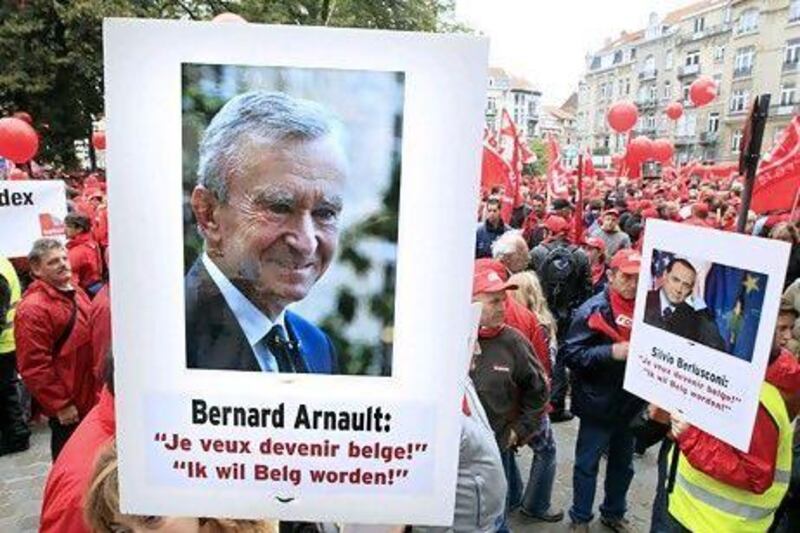Rarely since revolutionary times has France's complicated relationship with wealth been demonstrated more sharply than in the raging debate on François Hollande's supertax of 75 per cent on annual earnings above €1 million (Dh4.7m).
It may be true that despite voting the new Socialist president and his party into power, the average citizens of the republic share the desire to have enough money to be comfortable. But it is widely held and supported in public opinion surveys they put family, holidays and hobbies first. The American author Ted Stanger was only half-joking when he said if leisure were an Olympic event, France would always win gold.
While some noses have been put out of joint by the Left's swift burial of Nicolas Sarkozy's "work more, earn more" initiative - making overtime pay tax-free - there has been no rush to the barricades in its defence.
And it is safe to conclude Mr Hollande's "bash the rich" election agenda won a sneaking regard beyond traditional left-wing support.
So no one should be surprised at the scant public sympathy shown towards Bernard Arnault, the owner of the LVMH luxury goods group and also the world's fourth-largest fortune, after he was revealed to have applied for citizenship of neighbouring Belgium, where the wealthy find the fiscal regime more agreeable.
Mr Arnault insists his decision was inspired by personal and not tax or political concerns. But these protestations and his pledge to go on paying French taxes have provoked some scepticism.
This would-be Belgian, whose business empire includes Louis Vuitton, Hermès, Moët & Chandon and Sephora, is not the only prosperous man whose voice has been heard in the controversy over Mr Hollande's determination to impose a tax his opponents say will drive investment and, therefore, jobs out of France.
For Yannick Noah, the French tennis champion turned rock star, it was "logical" the rich should pay 75 per cent as part of a national effort in troubled times.
Among the tiny number of French residents liable to be caught up in a largely symbolic levy, the country's most expensive footballer, Javier Pastore, who cost the Qatar-owned Paris Saint-Germain €43m, has said he would pay the supertax if it were imposed. Even before the elections, as the Sarkozy presidency entered its dying phase, 16 magnates had put their names to an appeal published in the news magazine Le Nouvel Observateur for people such as themselves to pay more tax. Yet each example carries a reminder of that complex French relationship with money.
Noah proudly declares he makes his income thanks to the French public and accordingly pays his taxes in France; all the same, he has had a 16-year running battle with the authorities over earlier non-payment when he lived in Switzerland. Pastore plays for a club apparently willing to pay its stars' salaries net, suggesting it also picks up their tax bills.
Challenged by the newspaper Le Monde a year after their "come and tax us" plea, the affluent 16 proved less vocal about the post-electoral reality. Among the few willing to speak, there was little enthusiasm for Mr Hollande's gesture.
"If I dared, I would say the outcome goes beyond what we expected," Stéphane Richard, the chief executive of Orange, told the newspaper. "All things considered, this is a tax most do not want. Too onerous, badly calibrated."
Another top earner, speaking anonymously, described the 75 per cent tax as "morally and politically legitimate but economically stupid".
During the presidential election, Mr Hollande famously declared on television: "I don't like the rich."
He has since taken charge of a country in a mess. He estimates he must find €30 billion in new taxes and spending cuts to meet his target of reducing the public deficit to 3 per cent of GDP by the end of next year.
Taxing the super-rich at 75 per cent for the next two years, as intended, will contribute only a fraction. No more than 3,000 individuals will be affected and some of those may seek ways, such as by deferring the salaries they pay themselves, to avoid or lessen the impact.
The real purpose of the tax may be in creating the impression - while the middle class is battered by the taxman and the working class suffers the effects of squeezed public services - that the most advantaged members of society are doing their bit, too, to dig France out of its share of Europe's financial crisis.






